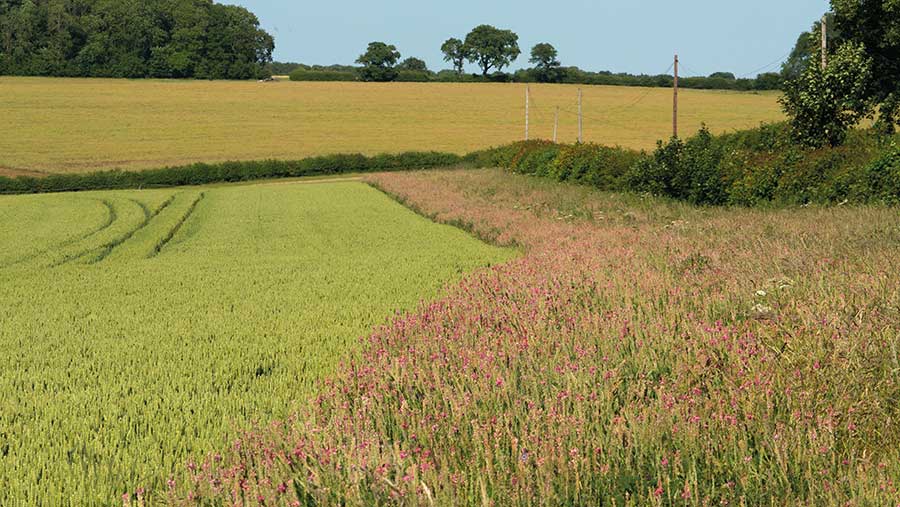‘Haphazard’ ELM scheme roll-out puts farms at risk, say MPs
 © Tim Scrivener
© Tim Scrivener Farmers in England are at risk of being forced out of business under a “haphazard” transition from the old Common Agricultural Policy (CAP) to the new Environmental Land Management (ELM) scheme, a cross-party committee of MPs has warned.
In its latest report, the Environment, Food and Rural Affairs (Efra) select committee calls on the government to fully assess the impact that “the biggest change to agricultural policy in 70 years” will have on farm businesses.
See also: Government watchdog casts doubt on ELM scheme delivery
The planned new scheme, which phases out direct payments to farmers in favour of “public money for public goods”, is about to be piloted, with almost 1,000 farmers having applied to the base-level Sustainable Farming Incentive (SFI).
These contracts are due to start in November, with the full SFI opening to all farmers in 2022.
The Local Nature Recovery and Landscape Recovery elements of ELM should be fully operational by 2027.
Despite this clear Defra timetable, the report says there is still “considerable uncertainty” and a “failure of communication” overshadowing the planned shake-up of agricultural support.
In particular, it raises concerns that there is still no long-term budget commitment, beyond the life of the current parliament, suggesting some farmers may find pursuing intensive farming more financially viable than entering into ELM.
It also complains that, with the clock ticking, Defra has shown little flexibility in terms of the timing of change, while communication delays have prevented farmers from preparing adequately for the transition.
“While the committee commends the government’s commitment to co-design the scheme with farmers, it notes that the ‘disconnect’ between listening to stakeholders and acting on this feedback could represent a significant missed opportunity,” it says.
As such, the Efra committee has made a number of recommendations, including:
- Defra must publish an impact assessment, detailing the consequences of transition, ahead of wider roll-out of the ELM scheme in 2022.
- The department must regularly review its transition plan, and develop contingency plans for flexibility in the removal of subsidies, to ensure farms remain viable.
- It must develop a clear engagement strategy which connects with the full range of farmers and land managers.
- Before the SFI application window opens in 2022, Defra must publish precise and measurable objectives for ELM.
- To provide assurance to farmers, Defra must, as a minimum, retain the current support budget until at least 2029.
- Defra must cater for the needs of uplands and tenant farms.
The new Efra committee report follows a similarly condemning document from the National Audit Office (NAO) last month.
This was particularly critical of the low level of farmer interest in the ELM scheme which, it said, signalled a lack of trust in Defra’s ability to manage agri-environment schemes.
It also criticised the accelerated introduction of the SFI and the narrowing of options available to farmers.
The Efra committee’s demand for greater flexibility also reflects a recent call by the NFU for Defra to delay the phase-out of Basic Payment Scheme money in 2023 and 2024, which, it says, is necessary to keep businesses afloat at a time of severe input inflation.
These demands, and the criticisms of the NAO, were rejected by Defra secretary George Eustice at the recent Conservative Party conference.
Mr Eustice said “sitting on our hands for four years” was not an option.
Comment from Efra committee chair Neil Parish MP

We are entering a period of seismic change for British farming, as it rises to challenges posed by climate change and the new post-Brexit trading conditions.
Farmers are also having to respond to the government taking advantage of our departure from the EU to reshape English agricultural policy, moving away from the CAP system of direct payments.
This shift offers an opportunity to design a scheme that enables farmers to protect and improve the environment, while producing fresh and affordable local food to world-leading animal welfare standards.
But, as we conclude in our report, the Efra committee is concerned that this once-in-a-generation opportunity could be squandered as the government scrabbles together its strategy for the transition.
We now have less than seven years before direct payments are fully phased out. In a farmer’s career, this is not a long time, and yet Defra, struggling with the burden of the pandemic, has been slow to communicate its plans.
Time and again, we heard from farmers asking how they will adequately prepare, given so little hard information.
The government’s approach of ploughing ahead at any cost is particularly bewildering given that they have not published any assessment of how it will impact farmers – particularly those for whom the CAP scheme was a major income source.
Defra needs to produce a comprehensive assessment of the economic and environmental impacts of its plans.
It must also show flexibility if its assessment shows that it needs to change course to ensure farm viability.
There is much to welcome in the aim of the government’s new ELM scheme but, without a credible plan to deliver it, clear messages to communicate it and certainty about long-term funding, it risks falling at the first hurdle.
